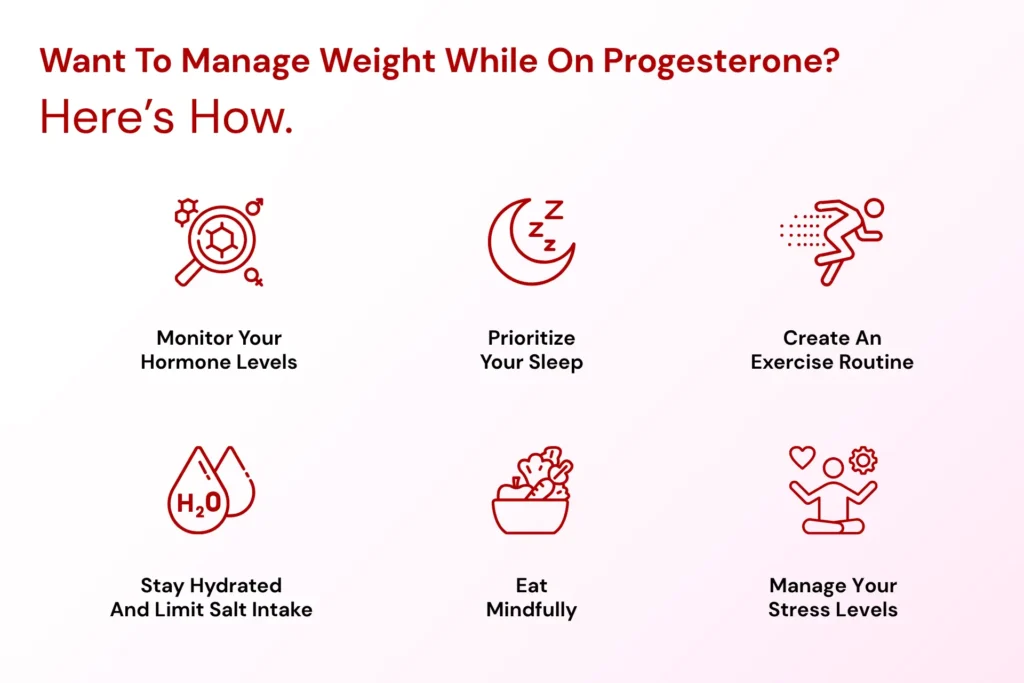Even if they don’t seem connected, hormone treatment and weight gain can happen at the same time. Progesterone is a common suspect, since it’s often used in birth control and hormone therapy. Some clinical findings suggest a link between progesterone use and gradual weight gain (especially in younger individuals) while others show little to no effect. Research doesn’t offer a simple answer, so let’s understand why progesterone's effects aren’t necessarily the same for everyone.
Overview Of Progesterone
Progesterone is a natural steroid hormone mainly produced by the adrenal glands and gonads, including the ovaries in women and the testes in men.
In women, its production increases after ovulation when the corpus luteum forms from the released egg.
The corpus luteum is the primary source of progesterone for the first ten weeks of pregnancy until the placenta takes over.
Progesterone, made from cholesterol, plays a vital role in reproductive health.
It aids in preparing the uterine lining for a fertilized egg and regulates menstrual cycles.
In early pregnancy, it nourishes the endometrium in the uterus.
As pregnancy continues, progesterone levels rise, preventing uterine contractions and priming the breasts for breastfeeding.
Does Progesterone Cause Weight Gain?
People respond differently to progesterone.
Some report gaining weight, but research does not consistently confirm this effect for everyone.
For example, a study that followed around 200 teenage girls for 18 months found that those using progesterone-based contraception gained more weight than those on other forms.
However, a separate study on teens who were using Nexplanon, a progesterone-releasing implant, didn’t show any increased risk of weight gain compared to users of other birth control types.
A larger review of available studies also found little evidence to support a strong connection between progesterone-only birth control and weight gain.
Even when reported, weight gain was minimal.
Since each body reacts differently, it’s impossible to identify a real difference with precision.
Menopause, Progesterone, And Weight Gain
Progesterone usually helps regulate metabolism and support fat processing.
Its absence could thus cause weight gain, particularly during perimenopause and menopause.
This is often due to hormonal changes, since progesterone levels drop more quickly than estrogen levels do.
This sets up an ‘estrogen dominance’, a hormonal imbalance that can encourage fat storage, especially around your abdomen.
What Factors Could Contribute To Weight Gain When On Progesterone?
Weight gain while taking progesterone can happen for several reasons, such as:
- Limited physical activity caused by medical conditions that require progesterone treatment can lead to gradual weight gain.
- People with conditions like endometriosis may struggle to burn as many calories due to pain.
- Hormonal changes during menopause, when progesterone is used in hormone therapy, can shift how the body stores fat and may lead to weight gain.
- Some people may experience increased appetite while on progesterone, which can lead to consuming more calories than needed.
- Water retention, a common side effect of hormonal treatments, may temporarily increase body weight in some individuals.
What Are The Other Side Effects Of Taking Progesterone?
Taking progesterone, especially in high doses or without proper guidance, can lead to various side effects, including:
- Upset stomach
- Mood swings
- Arm or leg weakness or numbness
- Breast tenderness or pain
- Coughing up blood
- Vaginal discharge
- Urinary difficulties
- Tiredness
- Migraines
- Runny nose
- Muscle, joint, or bone pain
- Difficulty breathing or swallowing
Most side effects are mild, though some may turn severe.
For example, it can cause blood clotting issues, leading to leg swelling, shortness of breath, or chest pain.
Uncommon but severe reactions include vision problems, seizures, and depression.
Consult your doctor if you observe any unusual symptoms.
When To See A Doctor
Consult your doctor if you notice any new or unexplained physical or emotional changes while taking progesterone.
If you face symptoms like emotional discomfort, unusual discharge, difficulty urinating, or a persistent cough, do not wait for them to go away on their own.
Even changes in sleep, appetite, or energy levels that feel different from your usual state deserve attention from a medical professional.
If an existing condition worsens after starting the medication, or if you're unsure whether something you're experiencing is related, it's best to consult your doctor.
Noticing and acting on early signs can make a real difference in your treatment journey.
Tips To Help Manage Weight While Taking Progesterone
Managing weight on progesterone involves balancing hormones and adjusting lifestyle habits.
Here are a few valuable tips:
- Monitor your hormone levels: Excess progesterone may contribute to weight gain, especially from supplements or medications. Consult your doctor to ensure your levels are well-balanced.
- Eat mindfully: Choose meals rich in protein, fiber, and healthy fats to support metabolism, reduce cravings, and help maintain stable blood sugar levels.
- Prioritize your sleep: Get enough sleep, around 7–9 hours each night. Poor sleep can disrupt hunger-related hormones and lead to overeating.
- Create an exercise routine: Set yourself a weekly target of 150 minutes of moderate physical activity like cycling, or 75 minutes of vigorous exercise like swimming.
- Stay hydrated and limit salt intake: Since progesterone can cause water retention, drinking enough water and reducing sodium intake helps reduce bloating.
- Manage your stress levels: High stress raises cortisol, which can promote fat storage. Use calming practices like deep breathing, yoga, or meditation to control stress.

FAQs About Progesterone And Weight Gain
Is It Hard To Lose Weight On Progesterone?
Losing weight while on progesterone depends on the underlying hormone balance in your body.
If weight issues are linked to low progesterone levels, supplementing with progesterone may support your weight loss goals by correcting estrogen dominance.
When your hormones are out of balance, your body could resist change, dampening your efforts until your hormone balance is stabilized.
How Do I Stop Progesterone Weight Gain?
Progesterone weight gain can be managed by focusing on a balanced diet, proper sleep, regular exercise, and stress control.
Foods packed with fiber, protein, and healthy fats can reduce hunger, while exercise boosts metabolism.
Reducing stress helps balance hormones, and quality sleep supports overall weight management.
What Happens If You Take Progesterone Without Estrogen?
In specific situations, taking progesterone without estrogen is sometimes recommended.
It may be a safer option for those who are sensitive to estrogen or have a history of estrogen-sensitive cancers.
During perimenopause, when estrogen levels often fluctuate and progesterone levels drop, adding progesterone can help restore balance and ease related symptoms.
Some women report improved sleep, reduced night sweats, and fewer heat sensations with progesterone-only treatment.
It may also have a calming effect that helps with mood and sleep quality.
For women with a uterus, estrogen alone increases the risk of endometrial cancer by thickening the uterine lining.
In these cases, progesterone is needed to counterbalance estrogen's effects and prevent the uterine lining's thickening.
What Not To Do While Taking Progesterone
While taking progesterone, refrain from activities that require mental alertness, such as driving or using machinery, until you are sure how the medication affects you.
When taking progesterone, following some precautions to avoid side effects and stay safe is essential.
- Avoid activities that need full attention: Progesterone can cause drowsiness, dizziness, or fatigue. Don’t drive, operate machinery, or do anything requiring quick reactions or alertness until you know how the medicine affects you.
- Be careful when rising or changing positions: Progesterone may lower your blood pressure, especially when taking it for the first time. Standing up quickly from lying down or sitting can cause dizziness, lightheadedness, or fainting. Always get up slowly and carefully to prevent this.
- Rise slowly and steadily: When getting out of bed or standing from a chair, sit up momentarily and place your feet flat on the floor. Waiting until you feel steady before standing fully helps your blood pressure adjust, lowering the risk of dizziness or fainting.
- Avoid alcohol and sedatives: Alcohol and sedatives can increase side effects like drowsiness and poor coordination when combined with progesterone. It’s best to avoid alcohol and check with your doctor before taking any other medications that cause sleepiness.
- Do not stop progesterone suddenly: Even if you experience side effects, don’t stop taking progesterone abruptly. Stopping suddenly can upset your hormone balance and cause withdrawal symptoms. Always consult your doctor before changing or stopping your dose.
What Is The Most Common Problem With Progesterone?
The most common problem with progesterone is low levels of the hormone, which can cause the following:
- Trouble sleeping
- Irregular periods
- Difficulty getting pregnant
- Feeling anxious or depressed
- Sweating or feeling unusually warm
While high progesterone is usually not a concern, in rare cases, it may be linked to ovarian or adrenal cancer.
Summary: Does Progesterone Cause Weight Gain?
- Progesterone may cause weight gain in some individuals, but research is mixed and often shows minimal impact.
- Hormonal imbalance during menopause, especially estrogen dominance due to low progesterone, may contribute to abdominal weight gain.
- Factors like reduced activity, increased appetite, and water retention during progesterone treatment can lead to weight gain.
- Progesterone affects metabolism as low levels may slow fat processing and increase fat storage.
- Managing weight involves balancing hormones, regular exercise, mindful eating, good sleep, and stress control.
- Common side effects include mood swings, fatigue, breast tenderness, and, in rare cases, serious issues like blood clots or depression.
- Seek medical advice if you notice unusual physical or emotional symptoms while on progesterone.
Others Are Also Reading

The Female Hormone: Estrogen and Its Influence on Women's Wellness

How Genes and Hormones Interact to Influence Your Health

Pros And Cons Of Hormone Therapy For Breast Cancer
References
https://www.ncbi.nlm.nih.gov/books/NBK558960
https://jamanetwork.com/journals/jamapediatrics/fullarticle/204332#google_vignette
https://pmc.ncbi.nlm.nih.gov/articles/PMC6742552
https://pubmed.ncbi.nlm.nih.gov/27567593
https://drbrighten.com/does-progesterone-cause-weight-gain
https://www.medicalnewstoday.com/articles/324014
https://www.narayanahealth.org/blog/high-progesterone-symptoms-and-side-effects
https://www.medicalnewstoday.com/articles/327326
https://medlineplus.gov/druginfo/meds/a604017.html
https://www.endocrinewellness.com/hormonal-weight-gain
https://my.clevelandclinic.org/health/diseases/10312-estrogen-dependent-cancers
https://www.mayoclinic.org/diseases-conditions/menopause/in-depth/hormone-therapy/ART-20046372
https://my.clevelandclinic.org/health/drugs/19484-progesterone-capsules
https://my.clevelandclinic.org/health/body/24562-progesterone





